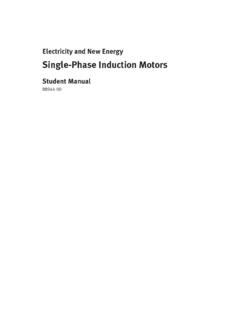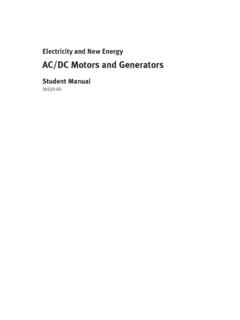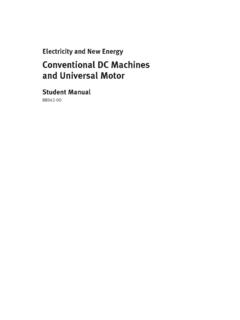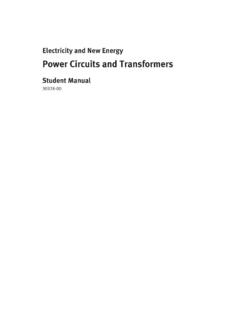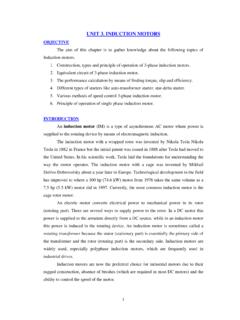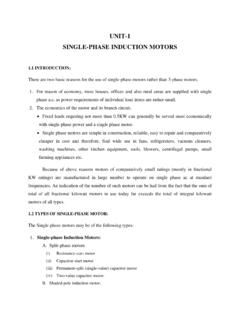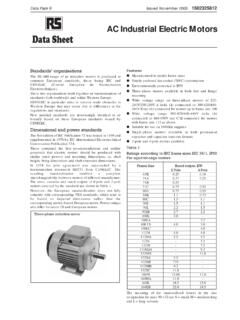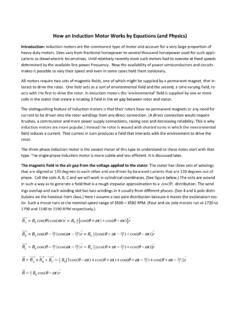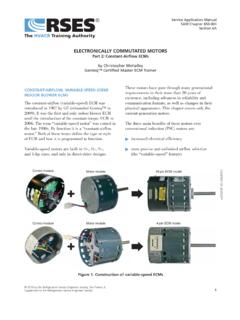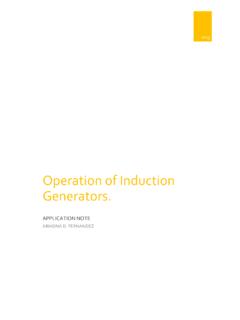Transcription of AC/DC Motors and Generators - Lab-Volt
1 Electricity and New EnergyAC/DC Motors and Generators Student Manual 30329-00 Order no.: 30329-00 Revision level: 12/2014 By the staff of Festo Didactic Festo Didactic Lt e/Ltd, Quebec, Canada 1996, 2010 Internet: e-mail: Printed in Canada All rights reserved ISBN 978-2-89640-422-3 (Printed version) ISBN 978-2-89747-161-3 (CD-ROM) Legal Deposit Biblioth que et Archives nationales du Qu bec, 2010 Legal Deposit Library and Archives Canada, 2010 The purchaser shall receive a single right of use which is non-exclusive, non-time-limited and limited geographically to use at the purchaser's site/location as follows. The purchaser shall be entitled to use the work to train his/her staff at the purchaser's site/location and shall also be entitled to use parts of the copyright material as the basis for the production of his/her own training documentation for the training of his/her staff at the purchaser's site/location with acknowledgement of source and to make copies for this purpose.
2 In the case of schools/technical colleges, training centers, and universities, the right of use shall also include use by school and college students and trainees at the purchaser's site/location for teaching purposes. The right of use shall in all cases exclude the right to publish the copyright material or to make this available for use on intranet, Internet and LMS platforms and databases such as Moodle, which allow access by a wide variety of users, including those outside of the purchaser's site/location. Entitlement to other rights relating to reproductions, copies, adaptations, translations, microfilming and transfer to and storage and processing in electronic systems, no matter whether in whole or in part, shall require the prior consent of Festo Didactic GmbH & Co.
3 KG. Information in this document is subject to change without notice and does not represent a commitment on the part of Festo Didactic. The Festo materials described in this document are furnished under a license agreement or a nondisclosure agreement. Festo Didactic recognizes product names as trademarks or registered trademarks of their respective holders. All other trademarks are the property of their respective owners. Other trademarks and trade names may be used in this document to refer to either the entity claiming the marks and names or their products. Festo Didactic disclaims any proprietary interest in trademarks and trade names other than its own. Festo Didactic 30329-00 III Safety and Common Symbols The following safety and common symbols may be used in this manual and on the equipment: Symbol Description DANGER indicates a hazard with a high level of risk which, if not avoided, will result in death or serious injury.
4 WARNING indicates a hazard with a medium level of risk which, if not avoided, could result in death or serious injury. CAUTION indicates a hazard with a low level of risk which, if not avoided, could result in minor or moderate injury. CAUTION used without the Caution, risk of danger sign , indicates a hazard with a potentially hazardous situation which, if not avoided, may result in property damage. Caution, risk of electric shock Caution, hot surface Caution, risk of danger Caution, lifting hazard Caution, hand entanglement hazard Notice, non-ionizing radiation Direct current Alternating current Both direct and alternating current Three-phase alternating current Earth (ground) terminal Safety and Common Symbols IV Festo Didactic 30329-00 Symbol Description Protective conductor terminal Frame or chassis terminal Equipotentiality On (supply) Off (supply) Equipment protected throughout by double insulation or reinforced insulation In position of a bi-stable push control Out position of a bi-stable push control Festo Didactic 30329-00 V Table of Contents Preface.
5 XI About This Manual .. XIII unit 1 Fundamentals for Rotating Machines .. 1 An introduction to rotating machines. Work, speed, torque, and power. Operation of the prime mover/dynamometer module. motor losses and efficiency. Ex. 1-1 Prime Mover and Brake Operation (Model 8960-2) .. 11 Familiarization with the Four-Quadrant Dynamometer/Power Supply operating in the prime mover mode: measurement of the speed and the opposition torque produced by the driven machine. Familiarization with the Four-Quadrant Dynamometer/Power Supply operating in the brake mode: measurement of the speed and output torque of a drive motor with a brake and a dynamometer.
6 Ex. 1-2 Prime Mover and Brake Operation (Model 8960-1) .. 29 Familiarization with the Prime Mover/Dynamometer operating in the prime mover mode: measurement of the speed and the opposition torque produced by the driven machine. Familiarization with the Prime Mover/Dynamometer operating in the brake mode: measurement of the speed and output torque of a drive motor with a brake and a dynamometer. Ex. 1-3 motor Power, Losses, and Efficiency .. 45 Determining the mechanical output power of a motor from the speed and torque. Mechanical and electrical losses in Motors . Determining the efficiency of a motor . unit 2 DC Motors and Generators .. 61 The operating principles of direct current (DC) Motors and Generators .
7 The different types of dc Motors and Generators and their particularities. Ex. 2-1 The Separately-Excited DC motor .. 67 Operation of a separately-excited dc motor . Simplified equivalent circuit of a DC motor . Relationship between the no-load speed and the armature voltage. Relationship between the motor torque and the armature current. Armature resistance. Speed-torque characteristic. Table of Contents VI Festo Didactic 30329-00 Ex. 2-2 Separately-Excited, Series, Shunt, and Compound DC Motors .. 81 Effect of the field current on the speed-voltage and torque-current characteristics of a separately-excited dc motor . Description and operation of the series, shunt, and compound dc Motors .
8 Comparing the speed-torque characteristics of the separately-excited, series, shunt, and compound dc Motors . Ex. 2-3 Separately-Excited, Shunt, and Compound DC Generators .. 99 Operation and characteristics of a separately-excited dc generator. Effect of the field current on the characteristics of a separately-excited DC generator. Simplified equivalent circuit of a DC generator. Operation and characteristics of self-excited DC Generators . Comparing the voltage-current characteristics of the separately-excited, shunt, cumulative-compound, and differential-compound dc Generators . unit 3 Special Characteristics of DC Motors .. 121 The behaviour of dc machines when the armature and field currents exceed the nominal values.
9 Operation of the universal motor . Ex. 3-1 Armature Reaction and Saturation Effect .. 123 Armature reaction. Effect of the armature reaction on the characteristics of DC machines. Armature inductance. Use of permanent-magnets to reduce armature reaction. Saturation. Effect of the saturation on the characteristics of DC machines. Ex. 3-2 The Universal motor .. 139 Direction of rotation versus the polarities of the armature and field currents. DC and AC operation of a universal motor . Improving AC operation by adding a compensating winding that reduces the armature inductance. unit 4 AC induction Motors .. 157 The principles of electromagnetic induction . Rotating magnetic field and synchronous speed.
10 Demonstrating the operation and characteristics of AC induction Motors . Table of Contents Festo Didactic 30329-00 VII Ex. 4-1 The Three-Phase Squirrel-Cage induction motor .. 159 Creating a rotating magnetic field in a three-phase squirrel-cage induction motor . Synchronous speed. Description and operation of the three-phase squirrel-cage induction motor . Torque versus speed characteristic. Reactive power required for creating the rotating magnetic field. Ex. 4-2 Eddy-Current Brake and Asynchronous Generator .. 171 Description and operation of the eddy-current brake. Operating a three-phase squirrel-cage induction motor as an asynchronous generator. Demonstrating that an asynchronous generator can supply active power to the AC power network.
